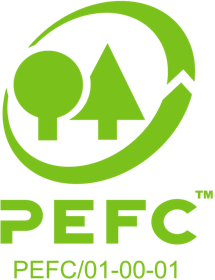As a big consumer of imported materials, Singapore is being encouraged to become a centre of influence, committed to responsible procurement from the Asian region’s forests and plantations.
This was the message from Ben Gunneberg, PEFC International CEO, speaking at a Roundtable and Lunch at Grand Copthorne Hotel on 19 September. The event was attended by 50 representatives from government agencies, think tanks, industry bodies, certification bodies, private sector companies and media.
It also marked the launch of PEFC’s Chain of Custody certification scheme, now recognised by the Singapore Accreditation Council (SAC), which is managed by Enterprise Singapore.
Deputy Director of Enterprise Singapore Ms Lee Ham Eng told the gathering that this scheme provides greater support to the industry to meet the Green Mark requirement for Mass Engineered Timber (MET) to be sourced from sustainably managed forests. It also facilitates recognition and acceptance of certified wood products from Singapore’s key trading partners, notably Indonesia, Malaysia and China, all of which have PEFC endorsed forest certification systems.
Mr Gunneberg gave an overview of PEFC’s work and stressed that sustainable forest management can contribute to meeting social, economic and environmental challenges, as well as help countries and companies address all 17 United Nations Sustainable Development Goals.
With 17 million hectares of forests certified in Asia, it’s the fastest growing region for PEFC. However, Mr Gunneberg pointed out that there’s a lot of room to grow responsible sourcing in countries like Singapore, which currently has only 22 Chain of Custody certificate holders out of a total 1421 throughout Asia.
Mr Gunneberg said there’s greater value in expanding Chain of Custody certification in Singapore by incorporating it into private and public sector procurement policies, demonstrating support for sustainably managed forests and meeting UN Sustainability Development Goals.
It also enables companies to meet legality issues and customer expectations as well as introduce traceability solutions into the supply chain.
Besides certification of wood for buildings and furniture, there’s the opportunity to greatly increase the use of certification and the PEFC logo for publishing, printing, paper and packaging, where Singapore has made an encouraging start.
He pointed out to where Singapore has already made its mark in the region by providing the expertise of one of its smart companies, Double Helix Tracking Technologies, to work with PEFC in Myanmar to help set up forest certification process and meet stringent timber regulations in the European Union, United States and Australia.
Mr Gunneberg also drew attention to The Local Tree Project, an initiative by Singapore wood crafts company Roger & Sons and supported by National Parks Board, to turn discarded logs into fashionable furniture, which is very much aligned with the principles of PEFC’s Trees Outside Forests.
As Southeast Asian countries, including Singapore, are currently experiencing a worsening air pollution situation – called “transboundary haze” - from out of control forest fires and peatland burning in Indonesia, Mr Gunneberg stressed that having effective fire management in place is a critical component of the PEFC forest certification process.
“Companies that are PEFC certified have spent tens of millions of dollars on implementing mechanisms to train people as champions in the local communities to help everyone understand the disadvantages of fire on the health of elderly people and children in the community,” Mr Gunneberg said.
“We also have to change cultural mindsets on how we prepare land; how we provide opportunities for some very impoverished communities to prepare for the next season without resorting to fire.”
Publish your content with EB Publishing
It's about who you reach. Get your news, events, jobs and thought leadership seen by those who matter to you.









